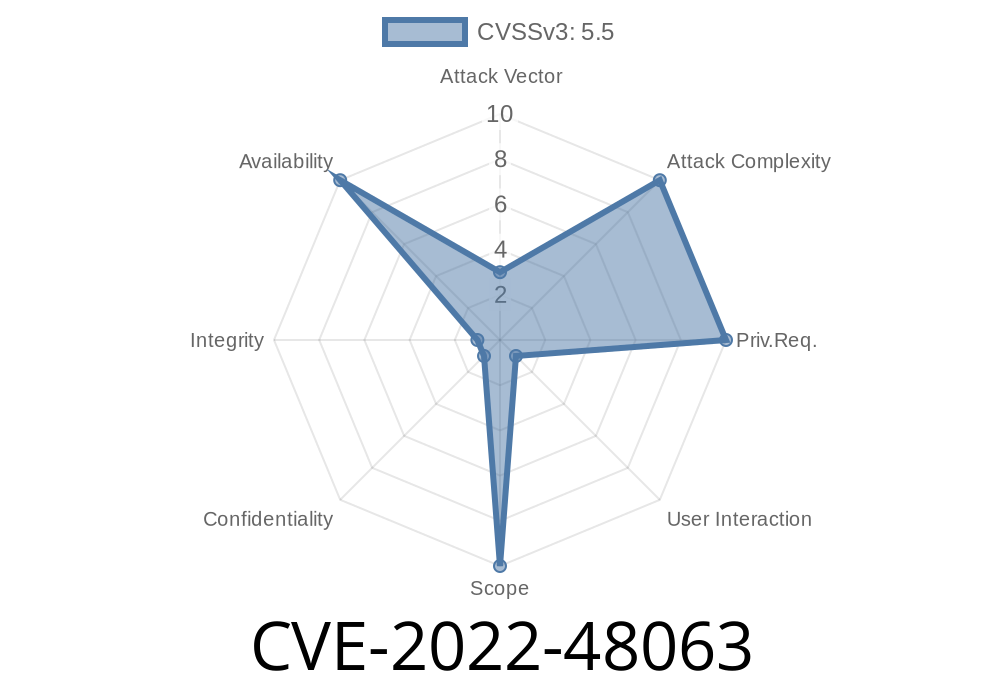In late 2022, security researchers discovered a vulnerability—CVE-2022-48063—in GNU Binutils, specifically affecting versions before 2.40. This vulnerability allows an attacker to excessively consume memory, and even trigger a Denial-of-Service (DoS) attack, by exploiting the load_separate_debug_files function in the dwarf2.c source file. Let’s break down what happened, why it matters, and how you might reproduce or protect against this flaw.
What is GNU Binutils?
GNU Binutils is a collection of binary tools that play a crucial role in compiling, linking, and managing object files and binaries—think of programs like ld (the linker), objdump (disassembler), and readelf. Developers and build systems all around the world rely on these tools.
The heart of the vulnerability lies in the file dwarf2.c, within the function
static void load_separate_debug_files(/* params */)
This function is responsible for loading additional debug information—often from external files tagged in the ELF binary. However, it failed to properly handle crafted ELF files that reference many, or deeply nested, separate debug files. When Binutils is directed to read such a binary, it recursively loads debug files, consuming more and more memory with each one.
The Real Problem
There was no sufficient check or limit on the depth (or quantity) of debug files it would load. An attacker could create a malicious ELF file that references hundreds or thousands of external debug files, and each reference triggers more allocations and fileopens. This balloons memory consumption until the system slows to a crawl or even crashes with an out-of-memory error (DoS).
Here’s a simplified flow of the vulnerable process
1. Craft a Malicious ELF: The attacker crafts an ELF file. Inside its DWARF debugging section, it plants references to many external debug files.
2. Trigger Binutils: Any user or automated build system that runs objdump, readelf, or similar tools on this ELF inadvertently triggers the vulnerability.
3. Recursive Loading: Binutils blindly follows these references, loading more and more files and consuming memory at each step.
4. System Impact: Memory use skyrockets. The system may run out of memory, slow dramatically, or completely hang, achieving a simple but effective DoS attack.
Sample Exploit Snippet
Below is a pseudo-snippet combining Python and Bash to illustrate how such a crafted ELF might be generated and tested:
# elf_gen.py - Minimal ELF file with recursive debug references (for educational use only)
with open("malicious_debug.txt", "wb") as f:
# Repeat bogus debug file path references
for i in range(10000): # Massive number of debug refs!
f.write(b"/tmp/nonexistent-debug-%d\n" % i)
# Now you'd use a tool to inject this debug section into an ELF, or
# patch an ELF binary's debug path table to point to 'malicious_debug.txt'.
Now, running
objdump --dwarf=info ./crafted-elf
Repeated references to the external debug file(s) force Binutils to try opening and reading them, quickly spiraling out of control.
Original code location (before patching)
// dwarf2.c
static void load_separate_debug_files(const char *filename, ...)
{
// Bug: No sufficient limit on how many or how deep files can be loaded
// Loops through debug sections and loads referenced files
}
Patch Example (simplified)
#define MAX_DEBUG_DEPTH 10
static int debug_depth = ;
static void load_separate_debug_files(const char *filename, ...)
{
if (debug_depth++ > MAX_DEBUG_DEPTH) {
// Prevent further recursion
return;
}
// Do recursive loading
debug_depth--;
}
After the patch, Binutils will stop loading files after a safe limit.
References and Further Reading
- Official CVE: CVE-2022-48063
- Binutils Bug Report: Sourceware Bugzilla #29806
- Commit Fixing Issue: Git Source Patch
- DWARF Debug File Format Spec
Who’s at Risk?
Anyone using a vulnerable version of GNU Binutils (before 2.40) is at risk—especially build infrastructure, continuous integration systems, developers, and security researchers who often analyze random or 3rd-party ELF binaries.
Limit External File Processing:
Use safe system policies to limit file open/file size/memory use in scripts.
Conclusion
CVE-2022-48063 is a classic example of how even mature, critical tools like GNU Binutils can fall prey to clever attacks hidden deep in “utility” code. By understanding not just what the bug is, but why it happens, security-minded users can better protect themselves—and avoid nasty surprises in even the most trusted open source tools.
> Have you updated your Binutils lately?
>
> If not, now’s the time!
*This post is original content. For more technical writeups, follow the links above or check your distribution for updates.*
Timeline
Published on: 08/22/2023 19:16:30 UTC
Last modified on: 10/06/2023 15:15:13 UTC
